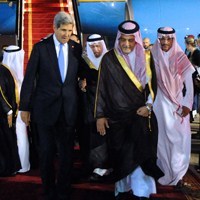For almost 70 years, the foundation of Saudi Arabia’s foreign policy rested on the kingdom’s relationship with the United States. America guaranteed Saudi security during a famous 1945 meeting between President Franklin Delano Roosevelt and King Abdulaziz ibn Saud aboard the USS Quincy in the Suez Canal. That commitment had stood the test of history.
The past three years, however, have brought enormous turbulence to the Middle East, and the Saudis have found Washington’s response increasingly worrisome. Saudi rulers are questioning America’s reliability as an ally and protector. They see the U.S. gradually relinquishing its pre-eminent role and allowing revolutionary Iran to expand its sphere of influence. As a result, the Saudis have launched a risky new foreign policy, one that discards the low-key, risk-averse, quiet diplomacy of previous years in favor of an assertive, high-risk, high-profile effort to shape the outcome of the many crises in the region.
Until recently, the Saudis had felt well-protected under the American security umbrella. The 1945 deal, reaffirmed by every president since FDR, dictated that the Saudis guaranteed vital oil supplies and the U.S. promised protection and a measure of stability. When Saddam Hussein sent Iraqi forces into Kuwait in 1990, the U.S sent more than half a million American military personnel into Saudi Arabia to prevent an Iraqi invasion, followed by a war that pushed the Iraqis out of Kuwait. America was a trusted and reliable ally, whose strategic objectives seemed to line up neatly with the Saudi’s.

